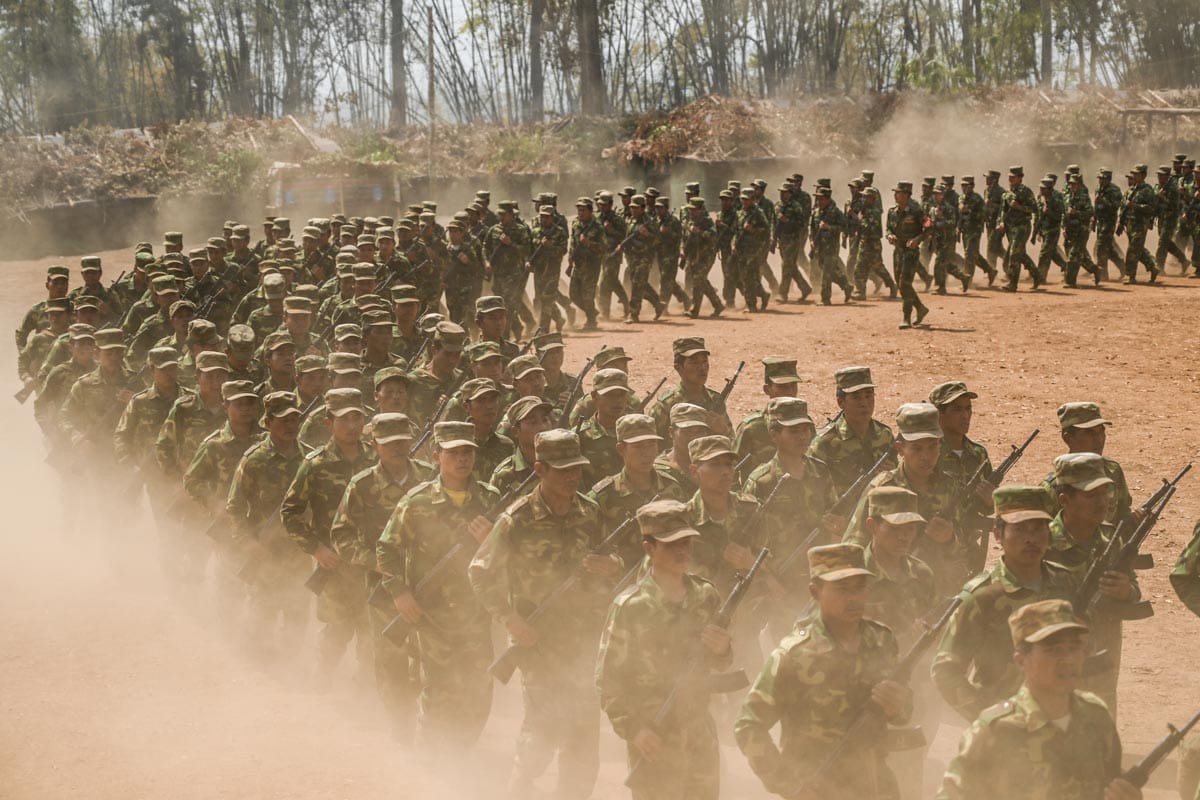Ceasefire undermined: TNLA expands control amid stalled peace talks

782

Phyo Lin Aung (NP News) - May 11
As regional stakeholders push for de-escalation in northern Myanmar, recent developments suggest that the Ta’ang National Liberation Army (TNLA), the armed wing of the Palaung State Liberation Front (PSLF), is using the current ceasefire period not to pursue peace, but to fortify its military position and intensify attacks on the Tatmadaw. This tactic has raised concerns about local stability and the integrity of ongoing negotiations.
During the May 4 press conference, the PSLF acknowledged growing pressure from China to cease hostilities against the Tatmadaw. Despite Beijing’s proactive mediation, the TNLA remains steadfast in its military objectives and refuses to compromise on key territorial gains.
The most recent dialogue, the seventh round of talks between the State Administration Council (SAC) and the PSLF took place in Kunming, China, in late April. The negotiations, facilitated by China and attended by PSLF Deputy Chairman Tar Gyut Jar and SAC delegate Lieutenant General Ko Ko Oo, failed to produce any significant breakthroughs. A central point of contention was the TNLA’s refusal to withdraw from five strategically important towns—Nawnghkio, Kyaukme, Hsipaw, Mogok, and Moemeik—and return to their constitutionally mandated self-administered zones of Namhsan and Mongton in northern Shan State.
These towns, seized during the Tatmadaw’s simultaneous battles with various resistance forces, hold substantial strategic and economic value. In particular, Mogok, known for its rich gemstone deposits, has become a TNLA stronghold where the group has entrenched business operations. Locals report increased extortion, economic restrictions, and limited security—suggesting that the TNLA is leveraging control over these areas for financial gain rather than governance or protection.
Although both sides agreed to reconvene in August for further negotiations, the situation on the ground tells a different story. Instead of de-escalating, the TNLA appears to be exploiting the ceasefire to expand its influence. During the May 4 press briefing, TNLA Joint General Secretary Colonel Tar Pan La made it clear that the group does not support China’s mediation, declaring that “Unless the revolutionary struggle succeeds, not only the current generation but also future generations will continue to suffer from the impacts of war.”
Despite the 2008 Constitution granting the Palaung authority to self-administer only Namhsan and Mongton, the TNLA expanded its control during the emergency period, seizing larger areas while the Tatmadaw was preoccupied with widespread unrest. This expansion has not only hindered peace efforts but also drawn criticism for violating constitutional provisions and exacerbating national fragmentation.
The Tatmadaw, for its part, has indicated it will no longer remain passive in the face of these developments. Although the Tatmadaw extended a unilateral ceasefire until the end of May to support earthquake relief operations, it has warned that continued ceasefire violations by ethnic armed organizations (EAOs) and PDFs will not go unanswered. These groups use the government’s focus on natural disaster response to make territorial and tactical gains.
The military contends that while groups like the TNLA issue public statements supporting peace to appeal to international audiences, they continue to launch attacks behind the scenes. As a result, the Tatmadaw insists that its counterattacks are both justified and necessary to protect national security.
In addition to peace negotiations, external pressure—particularly from China—has emerged as a powerful influence in shaping the course of the conflict. The PSLF revealed that the Chinese government has consistently demanded a cessation of hostilities along the China–Myanmar border, near critical infrastructure such as gas pipelines, and in areas where Chinese business interests are located.
Colonel Tar Pan La elaborated that “China’s insistence is clear—they say there must be no fighting along the China–Myanmar border, no clashes along their gas pipeline, and no armed conflict in areas where they have business interests or factories. This has been consistently conveyed, not only through messages but also directly in person.”
He further stated that the Chinese authorities, including the Ruili City Administration, have sent formal communications reinforcing these restrictions.
He said, “There were threats against us. I think everyone will remember the letter that was recently sent to us by China’s Ruili City Administration. That’s not all. There has also been pressure—not just verbal threats, but through other means as well. There are ongoing pressures, beyond ordinary threats.”
Colonel Tar Pan La also disclosed that since June 2024, China has intermittently closed sections of the border in coordination with the SAC, severely impacting local livelihoods.
“Due to the joint blockade by China and the military regime, people are living under extreme restrictions. They can no longer trade or earn a living properly. The pressure from China has seriously affected ordinary civilians,” he explained.
As the next round of negotiations approaches in August, the gap between diplomatic dialogue and on-the-ground realities continues to widen. With both sides maneuvering to strengthen their positions, civilians remain the primary victims—trapped in a cycle of armed conflict, economic hardship, and political stalemate.
From the Tatmadaw’s perspective, any threat to territorial stability will inevitably provoke a military response. Should the situation escalate, the TNLA is unlikely to withdraw with the ease that the MNDAA once did. Its uncompromising demands and opportunistic territorial claims may ultimately leave it empty-handed—excluded from future negotiations and forced to retreat without honor or strategic gain. Without a genuine commitment to dialogue, the opportunity for an equitable resolution may slip away, deepening the country’s fragmentation. –